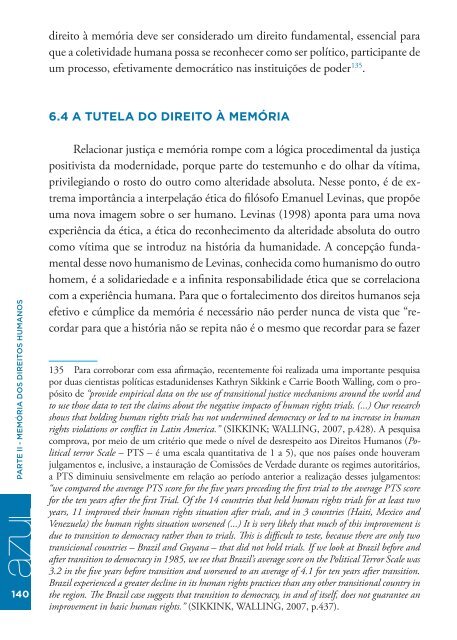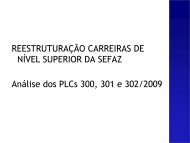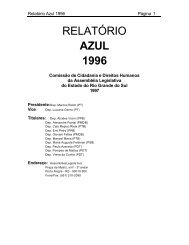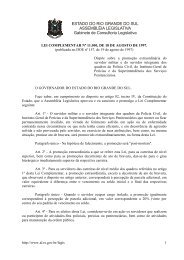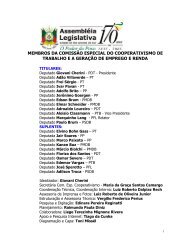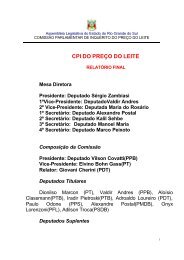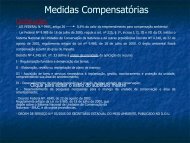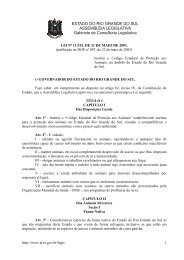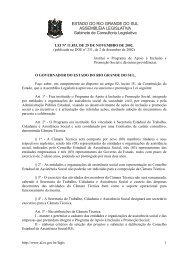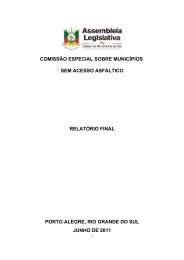- Page 1:
Comissão de Cidadania e Direitos H
- Page 4:
Sumário
- Page 9:
Artigos
- Page 12 and 13:
INTRODUÇÃOa marcar esse novo séc
- Page 14 and 15:
INTRODUÇÃO14entidades ou institui
- Page 16 and 17:
Cangaceiros - acrílico s/madeira -
- Page 18 and 19:
PARTE I - FUNDAMENTOS DOS DIREITOS
- Page 20 and 21:
PARTE I - FUNDAMENTOS DOS DIREITOS
- Page 22 and 23:
A bailarina - série Meninas - acr
- Page 24 and 25:
PARTE I - FUNDAMENTOS DOS DIREITOS
- Page 26 and 27:
PARTE I - FUNDAMENTOS DOS DIREITOS
- Page 28 and 29:
PARTE I - FUNDAMENTOS DOS DIREITOS
- Page 30 and 31:
PARTE I - FUNDAMENTOS DOS DIREITOS
- Page 32 and 33:
PARTE I - FUNDAMENTOS DOS DIREITOS
- Page 35 and 36:
positivos, notadamente os chamados
- Page 37 and 38:
a consequência seria a óbvia anul
- Page 39 and 40:
direitos que alguém poderia ter ou
- Page 42 and 43:
Homem só - gouache s/MDF - 46 X 34
- Page 44 and 45:
3.1 INTRODUÇÃOPARTE I - FUNDAMENT
- Page 46 and 47:
ambiente político propício ao má
- Page 48 and 49:
PARTE I - FUNDAMENTOS DOS DIREITOS
- Page 50 and 51:
PARTE I - FUNDAMENTOS DOS DIREITOS
- Page 52 and 53:
PARTE I - FUNDAMENTOS DOS DIREITOS
- Page 54 and 55:
PARTE I - FUNDAMENTOS DOS DIREITOS
- Page 56 and 57:
PARTE I - FUNDAMENTOS DOS DIREITOS
- Page 58 and 59:
PARTE I - FUNDAMENTOS DOS DIREITOS
- Page 60 and 61:
PARTE I - FUNDAMENTOS DOS DIREITOS
- Page 62 and 63:
PARTE I - FUNDAMENTOS DOS DIREITOS
- Page 64 and 65:
PARTE I - FUNDAMENTOS DOS DIREITOS
- Page 66 and 67:
PARTE I - FUNDAMENTOS DOS DIREITOS
- Page 68 and 69:
PARTE I - FUNDAMENTOS DOS DIREITOS
- Page 70 and 71:
internacionais de boa-fé (pacta su
- Page 72 and 73:
PARTE I - FUNDAMENTOS DOS DIREITOS
- Page 74 and 75:
ilidades do processo brasileiro. In
- Page 76 and 77:
As baianas - acrílico s/MDF - 39 X
- Page 78 and 79:
tia, em que radicalizaram com os Co
- Page 80 and 81:
PARTE I - FUNDAMENTOS DOS DIREITOS
- Page 82 and 83:
PARTE I - FUNDAMENTOS DOS DIREITOS
- Page 84 and 85:
PARTE I - FUNDAMENTOS DOS DIREITOS
- Page 86 and 87:
PARTE I - FUNDAMENTOS DOS DIREITOS
- Page 88 and 89:
cipal, mas foi disseminada por grup
- Page 90 and 91: O epicentro da oposição à ditadu
- Page 92 and 93: popular comparável à campanha em
- Page 94 and 95: como crimes conexos aos políticos,
- Page 96 and 97: PARTE I - FUNDAMENTOS DOS DIREITOS
- Page 98 and 99: REFERÊNCIAS BIBLIOGRÁFICASALBERTI
- Page 100 and 101: Olhares - acrílico s/MDF - 30,5 X
- Page 102 and 103: PARTE II - MEMÓRIA DOS DIREITOS HU
- Page 104 and 105: PARTE II - MEMÓRIA DOS DIREITOS HU
- Page 106 and 107: PARTE II - MEMÓRIA DOS DIREITOS HU
- Page 108 and 109: PARTE II - MEMÓRIA DOS DIREITOS HU
- Page 110 and 111: PARTE II - MEMÓRIA DOS DIREITOS HU
- Page 112 and 113: PARTE II - MEMÓRIA DOS DIREITOS HU
- Page 114 and 115: PARTE II - MEMÓRIA DOS DIREITOS HU
- Page 116 and 117: forma trivial. A mimese normaliza a
- Page 118 and 119: de exceção. Os torturadores de Gu
- Page 120 and 121: PARTE II - MEMÓRIA DOS DIREITOS HU
- Page 122 and 123: tagia as estruturas, instituições
- Page 124 and 125: PARTE II - MEMÓRIA DOS DIREITOS HU
- Page 126 and 127: PARTE II - MEMÓRIA DOS DIREITOS HU
- Page 128 and 129: PARTE II - MEMÓRIA DOS DIREITOS HU
- Page 130: TELES, Edson e SAFATLE, Vladimir Or
- Page 133 and 134: 6 A MEMÓRIA COMO DIREITO HUMANOFer
- Page 135 and 136: 6.2 A DIMENSÃO HUMANA E COLETIVA D
- Page 137 and 138: porque os períodos que antecederam
- Page 139: tante não é simplesmente remontar
- Page 143 and 144: no presente e no futuro. Sem que os
- Page 145 and 146: trials in Latin America. In Journal
- Page 147 and 148: 7 NILCE AZEVEDO CARDOSO:RELEMBRAR
- Page 149 and 150: em parte, mas precisa conhecer mais
- Page 151 and 152: 7.2 PORQUE NAS ÉPOCAS ESCURASSE ES
- Page 153 and 154: faculdade. Porque realmente a gente
- Page 155 and 156: pobreza. Agora, quando eu vejo aque
- Page 157 and 158: andar”. Imagine o medo. Claro que
- Page 160 and 161: Africanas - técnica mista s/tela -
- Page 162 and 163: 8.1 INTRODUÇÃO“... sem nenhum p
- Page 164 and 165: PARTE II - MEMÓRIA DOS DIREITOS HU
- Page 166 and 167: PARTE II - MEMÓRIA DOS DIREITOS HU
- Page 168 and 169: PARTE II - MEMÓRIA DOS DIREITOS HU
- Page 170 and 171: PARTE II - MEMÓRIA DOS DIREITOS HU
- Page 172 and 173: PARTE II - MEMÓRIA DOS DIREITOS HU
- Page 174 and 175: PARTE II - MEMÓRIA DOS DIREITOS HU
- Page 176: PARTE II - MEMÓRIA DOS DIREITOS HU
- Page 179 and 180: 9 DIREITO (FRATERNO) À MEMÓRIA ED
- Page 181 and 182: dos últimos, os reais “idealizad
- Page 183 and 184: vestidas violentas dos atos autorit
- Page 185 and 186: o único responsável pelo enfrenta
- Page 187 and 188: em relação com um eventual direit
- Page 189 and 190: sar, o é devido à presença const
- Page 191 and 192:
qualquer resquício de alteridade e
- Page 193 and 194:
social sonhada, permitindo que a co
- Page 195 and 196:
tura do relator do acórdão restar
- Page 197 and 198:
desnude na sucessão das frequentes
- Page 199 and 200:
menosprezar que já naquele momento
- Page 201 and 202:
argumento. Ao optar pela anistia, e
- Page 203 and 204:
valor inerente à consolidação da
- Page 205 and 206:
Brasil - OAB. Argdos.: Presidente d
- Page 208 and 209:
A cabana - acrílico/tela - 35 X 27
- Page 210 and 211:
PARTE III - SOCIEDADE DE DIREITOS H
- Page 212 and 213:
Pensar Trabalho e Direitos Humanos
- Page 214 and 215:
Abr./11 7,4 11,1 6,4 8,4 (1)- 2,8Ma
- Page 216 and 217:
Serviços 10.331 10.628 10.601 -27
- Page 218 and 219:
precisamos identificar nestas desco
- Page 220 and 221:
É dever de todos velar pela dignid
- Page 222 and 223:
PARTE III - SOCIEDADE DE DIREITOS H
- Page 224 and 225:
passando a exigir trabalhadores pol
- Page 226 and 227:
PARTE III - SOCIEDADE DE DIREITOS H
- Page 228 and 229:
PARTE III - SOCIEDADE DE DIREITOS H
- Page 230:
poder social que se circunscrevem
- Page 233 and 234:
11 DESAFIOS DOS PROFESSORES DIANTED
- Page 235 and 236:
crescente baseadas na inclinação
- Page 237 and 238:
tórico bem concreto. Eagleton, ten
- Page 239 and 240:
associa-se à crítica de Wood acer
- Page 241 and 242:
Ao valorizarmos a cooperação e a
- Page 243 and 244:
tradução: Ricardo Corrêa Barbosa
- Page 245 and 246:
12 EDUCAÇÃO, DIREITOS HUMANOSE SO
- Page 247 and 248:
Como os direitos humanos integram d
- Page 249 and 250:
humanos é fundamental para resgata
- Page 251 and 252:
A Educação em Direitos Humanos é
- Page 253 and 254:
por uma formação de pessoas autô
- Page 255 and 256:
12.3 UMA EDUCAÇÃO DIALÓGICA E CR
- Page 257 and 258:
entender os homens e as mulheres, a
- Page 259 and 260:
precisa também trabalhar a supera
- Page 261 and 262:
produzindo, assim, cultura, civiliz
- Page 263 and 264:
práticas opressoras. Um diálogo q
- Page 265 and 266:
MAGRI, Cledir A. Paulo Freire: In:
- Page 267 and 268:
13 O MUNDO DAS RELIGIÕES E APRÁTI
- Page 269 and 270:
invisíveis e espirituais... Nessas
- Page 271 and 272:
da sabedoria” do extremo oriente
- Page 273 and 274:
plano individual e no coletivo). Fa
- Page 275 and 276:
humano. Cabe ao praticante do credo
- Page 277 and 278:
principalmente da vontade política
- Page 280 and 281:
Cacique Akuab - acrílico s/madeira
- Page 282 and 283:
PARTE III - SOCIEDADE DE DIREITOS H
- Page 284 and 285:
PARTE III - SOCIEDADE DE DIREITOS H
- Page 286 and 287:
PARTE III - SOCIEDADE DE DIREITOS H
- Page 288 and 289:
cursos florestais mais abundantes.
- Page 290 and 291:
14.4 AS TERRAS INDÍGENAS NO RIO GR
- Page 292 and 293:
Cimi Regional Sul - População Ind
- Page 294 and 295:
Cimi Regional Sul - População Ind
- Page 296 and 297:
Cimi Regional Sul - População Ind
- Page 298 and 299:
Cimi Regional Sul - População Ind
- Page 300 and 301:
Cimi Regional Sul - População Ind
- Page 302 and 303:
c) Busque soluções para indenizar
- Page 304 and 305:
atividades, na Embrapa e nas secret
- Page 306 and 307:
um projeto de vida concreto, capaz
- Page 308 and 309:
S/ título - acrílico s/madeira -
- Page 310 and 311:
15.1 CONTEXTO E PROBLEMATIZAÇÃOPA
- Page 312 and 313:
15.2 HÁ OUTRAS HUMANIDADES E OUTRA
- Page 314 and 315:
15.3 RELEVÂNCIA DA ETNIA ENQUANTO
- Page 316:
O que se está querendo revelar aqu
- Page 319 and 320:
16 SITUAÇÃO CARCERÁRIA NO RIOGRA
- Page 321 and 322:
16.2 REVISTA ÍNTIMAPonto pautado e
- Page 323 and 324:
sos precisam realizar rodízio até
- Page 325 and 326:
estão sujeitas à constantes viola
- Page 327 and 328:
de não reabilitar, degenera. A rea
- Page 330 and 331:
S/ título - gouache/papel - 42 X 6
- Page 332 and 333:
17.1 CONTEXTUALIZANDO O PROBLEMAPAR
- Page 334 and 335:
PARTE IV - SITUAÇÃO ATUAL DOS DIR
- Page 336 and 337:
PARTE IV - SITUAÇÃO ATUAL DOS DIR
- Page 338 and 339:
IV - desenvolvimento de atividades
- Page 340 and 341:
S/ título - acrílico/tela - 40 X
- Page 342 and 343:
Além do próprio giro de capital,
- Page 344 and 345:
PARTE IV - SITUAÇÃO ATUAL DOS DIR
- Page 346 and 347:
18.2 OS PLANOS DE SAÚDE NESTE CONT
- Page 348:
a promoção, proteção e recupera
- Page 351 and 352:
19 PROSTITUIÇÃO FEMININA E DIREIT
- Page 353 and 354:
as prostitutas estariam entre os pr
- Page 355 and 356:
sexual se daria de forma extraconju
- Page 357 and 358:
Desse modo, o estudo sobre a vulner
- Page 359 and 360:
sociais e/ou as recompensas eleitor
- Page 361 and 362:
AIDS e orientar a tomada de posiç
- Page 363 and 364:
existe uma política pública que l
- Page 365 and 366:
LUMAHNN, Niklas. Introdução à Te
- Page 367 and 368:
20 NOVOS DESAFIOS PARA OS DIREITOSH
- Page 369 and 370:
sofrendo a não satisfação de nec
- Page 371 and 372:
É claro que essas divergências ta
- Page 373 and 374:
(família, comunicação, associaç
- Page 375 and 376:
mento de autoridade à autoridade d
- Page 378 and 379:
S/ título - acrílico/madeira - 42
- Page 380 and 381:
Alegre, o deputado e a assessoria d
- Page 382 and 383:
na tarde do dia 18 de maio porque n
- Page 384 and 385:
O médico Vilmar Taschetto Seixas a
- Page 386:
Segundo o coordenador do grupo Nuan
- Page 389 and 390:
22 A LEI MARIA DA PENHA E AVIOLÊNC
- Page 391 and 392:
sociais, independentemente de condi
- Page 393 and 394:
para minimizar o problema - além d
- Page 395 and 396:
titucionalidade 19, referente a Lei
- Page 397 and 398:
23 A LUTA POR MEMÓRIA, VERDADE EJU
- Page 399 and 400:
tes de informação, determinando a
- Page 401 and 402:
podem seguir representando um obst
- Page 403 and 404:
• os membros da Comissão não de
- Page 406 and 407:
Bichos - acrílico/tela - 40 X 60,5
- Page 408 and 409:
PARTE IV - SITUAÇÃO ATUAL DOS DIR
- Page 410:
PARTE IV - SITUAÇÃO ATUAL DOS DIR
- Page 413 and 414:
25 A OFICINA DE CRIATIVIDADE DOHOSP
- Page 415 and 416:
têm por fundamento mudanças no mo
- Page 417 and 418:
o paciente para adquirir a condiç
- Page 419 and 420:
momento em que produziu a série in
- Page 421 and 422:
do sobre a Oficina de Criatividade,
- Page 423 and 424:
ganhando tempo, enquanto ele tenta
- Page 425 and 426:
As ilustrações, neste Relatório
- Page 427 and 428:
SOUSA, Edson Luiz André de. Quando
- Page 429 and 430:
COMPETÊNCIAS DA COMISSÃOO artigo
- Page 431 and 432:
solicitação de câmaras de veread
- Page 433 and 434:
21/1128/11AP Jornada Combate àViol
- Page 435 and 436:
PUBLICAÇÕESNo sentido de se ampli
- Page 437 and 438:
PROJETO DE LEICria a Comissão Naci
- Page 439 and 440:
VIII - requisitar o auxílio de ent
- Page 441 and 442:
EM n.o 14 / 2010 - SDH-PR/MD/MJ/MPB
- Page 443 and 444:
outros órgãos públicos. Os acerv
- Page 445:
19. A Comissão Nacional da Verdade


